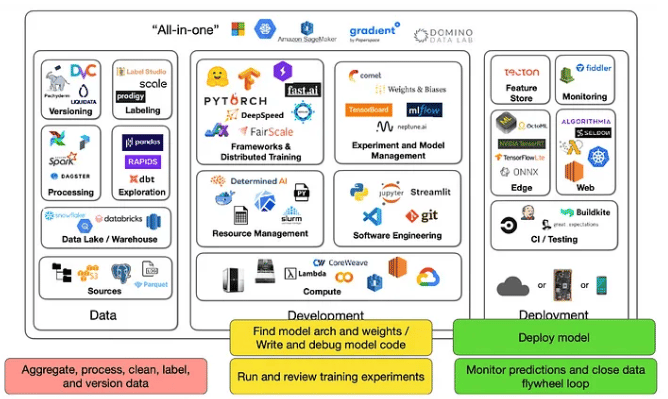Three years ago, I was a biology student who had no idea what a machine learning engineer does exception they
code
know machine learning
get well paid, and most importantly,
they are “cooler” than a biology researcher
Because no one around me was taking the path I was longing for, my every day was a psychological horror movie. A typical morning starts like this:
“If I can’t get a job immediately, I will be recognized as less successful than everyone else I know. No way I’m gonna let that happen.”
“If I change my career, that means the past 12 years of my life are wasted. No way I’m gonna let that happen.”
“Even if my career change was successful, I will much older than other programmers, and I will never catch up to their speed. No way I’m gonna let that happen.”
“Even if I become a machine learning engineer, I still don’t know what to do next. I still won’t become that billion-dollar startup founder who was raised by two highly educated parents and had a successful business at age 10. I will never be the winner anyway. What’s the point.”
“”
Ideas like that played in my head every day like Hallmark movies in Christmas. Whenever I turn on my brain, that’s the only show available.
Eventually, I got tired and turned off that TV. I lay down in my darkness and started enjoying this voidness. Then, a trespassed voice arrived.
That trespassed voice: “I know you are bored. Why the fuck can’t you just work on something? Isn’t that easier?”
Me: “No. sir? lady?. I need to think before acting. Also, I don’t like easy; I like to be challenged.”
That trespassed voice: “ Do you think you are mentally stable enough to argue with me?”
Me, staring into space for a while, signed: “You have a point. I will do the work.”
After that never-existed encounter, here came the new era. In this era, I started thinking more straight and bold, especially when arguing with other alternative selves inside me. I started making decision on what I want to be without referencing the source.
Gradually, a typical morning shifted from those horror movies to a vibrant documentary:
I am going to write a blog on entrepreneurship!
I am going to interview some startup founders today!
We have Buddies BBQ today!
I’m going to figure out the bug in my code today!
I still have a big face big nose, and make stupid judgments on people all the time, but I know what I live by:
“If I wake up in the morning again, I want to feel excited”
You know what I’m talking about.
I am excited to get up at 5 am today and start writing this article. You may think I am writing this for you. No. I’m writing this for myself.
OK, also for ya. Since you have read this far, there is a good chance you WILL love me and yourself.
It’s upsetting to watch people miss the opportunity because of these misconceptions, so I would be very happy about my life if any of my sharings below can help you win the game.
I chose these 3 fallacies because I had them when I started looking for a job in machine learning. I have recently heard these statements several times when mentoring other people to get a machine learning job.
Fallacy №1: “I don’t have five years of experience, so I’m not qualified for the position.”
You will never find a job description where you meet every requirement if it’s a good opportunity. If you already meet all the job requirements, why do you want to take it? Because if you take it, you may need to restart your job-seeking again because the growth space won’t work for you. Looking from the outside, everyone seems moving up in their career, but when you look inside, it always dips first before you rise. Because there is always a conflict between what you want and what you need. This leads to my point of view on what you should think instead.
Every senior engineer starts from being a junior engineer, so whatever you are struggling with, many other people have been already been on that route. Not exactly, but much common ground can be exploited. You can spend time wondering how hard this is and how much you hate the interview processes, or you can spend time practicing the craft and building a strategy around it. Your goal is not to be the greatest machine learning engineer and change this industry; your goal is to get into the right position where you can grow.
The last point I want to add under this one is, if you don’t like the deal, just leave it on the table. Be patient, and you will find a deal that deserves your work. But you need to be ready when that deal comes. I want to include this because., even at this stage, I have friends who are way smarter than me, but they waste their energy in complaining about their current work or the job market. I agree with the things they see, but if you can’t manage conflicting ideas in your head, you will constantly get overwhelmed. Understanding and commanding your thoughts and actions is not a nice-to-have skill, it’s the only way to win. Facing uncertainty without an answer is painful. If you are interested in that thread, you can read about cognitive dissonance and closure.
Fallacy №2: “I am hired for my technical skills, so I need to master programming and machine learning.”
Someone asked me recently “How did you master LeetCode?” My answer was “I didn’t!”.
I don’t think it’s possible or worth the time to master any technology in the realm of software engineer or machine learning, because the knowledge base and tooling always grows faster than your brain ingestion rate. These are the popular tools and publications in the past 5 years. Do you think there exists a person on the earth that can master all of these? If your answer is also no, then you know that is not the right way to play this game.

The idea of mastering anything hinders you from having a growth mindset. Let’s say you want to be very good at PyTorch. You dedicated 2 years to improve your skills. Then what? You won’t have a title on your forehead saying, “I’m the master of PyTorch, top of the mountain”. Focusing on technology does help you to fill up that success meter and grow into that identity a job gave to you. Still, it doesn’t directly provide value for the business that is paying you or your overall career growth. Technology is one of many tools you can use to solve a problem, but which tool to use depends on the nature of the problem, not on whether you are good at it. Instead of investing your time in mastering any specific tooling, it’s better to invest in practicing the habit of sitting through the stomachache when you realize you suck at pretty much everything that need to be done.
An analogy that may help illustrate this idea is the on-demand business model (examples: Instacart, Postmates, JustPark, task rabbit, and Airbnb). Instead of you having the long loop of manufacturing a product from supplier to customer, the on-demand business has it reversed. You manufacture what is demanded by the customer on the go. Apply this idea to your career growth. You don’t invest heavily on any technology or skills. You learn and grow your capacity on the go.
To correct this misconception: You are not paid for your skills. Instead, you are paid for your impact in that specific working environment you are hired for.
Fallacy №3: “Getting into big tech means I’m good enough as a software engineer.”
That is true.
If you don’t have your own standards.
Once, a recruiter from a well-funded startup reached out to me and told me I would be a perfect fit for this role, so I asked her, what exactly made them think so. Her answer was around the line of “because you are hired by Amazon, you must be good enough for us”
My reaction was “I don’t think this startup will make it.”
Big tech has a very different working environment than startups or freelancing. Most of your technical skills in big tech won’t be transferable to a different environment due to the internal tooling and company history. What made it worse is if you are not careful, you may end up developing bad ways of thinking in those big tech environments. Once you leave big tech, you will need to unlearn them and go through a phase of detoxing. The credibility you imagined that should come with the job title only works for people who haven’t had it.
Sometimes we learn from the noise rather than the signals. It’s extremely painful. You changed yourself for it, and only later you realized that sacrifice needs to be undone.
These are the 3 ideas I want you to get right so that you won’t waste your time or feel stuck with your progress. Machine learning is still in its early days, and there will be more and more people entering this industry, so please invest your time in yourself. I have never regretted the efforts I made for things I want.
Now, you may be wondering, so what’s the shortest path to get the first machine learning job? Here is the answer.
